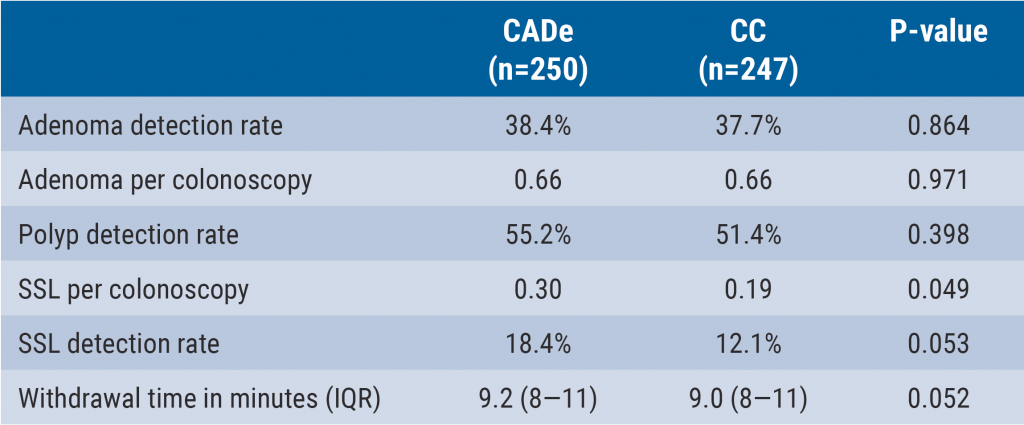https://doi.org/10.55788/05ccad9e
“The IL-23 inhibitor guselkumab has been approved for the treatment of plaque psoriasis and psoriatic arthritis,” said Prof. Axel Dignass (Goethe University, Germany) at the start of his presentation [1]. To further assess the potential of this agent, the phase 3 QUASAR induction study (NCT04033445) compared the efficacy of guselkumab and placebo in participants with moderately to severely active UC who had an inadequate response or intolerance to corticosteroids, immunosuppressants, and/or advanced therapies (ADT) such as TNF inhibitors, integrin receptor antagonists, or JAK inhibitors. The participants (n=701) were randomised 3:2 to guselkumab 200 mg, intravenously administered every 4 weeks, or placebo. Prof. Dignass presented the efficacy results at week 12, stratified by the history of inadequate response or intolerance to ADT.
In total, 49% (n=344) of the participants had an inadequate response or intolerance to ADT. Among them, approximately 88%, 54%, and 18% of the participants were non-responsive or intolerant to TNF inhibitors, integrin receptor antagonists, and/or JAK inhibitors, respectively. In the population with no history of inadequate response or intolerance to ADT (n=357), 32.4% of the participants on guselkumab achieved clinical remission compared with 11.8% of those on placebo (P<0.001). For symptomatic remission, the corresponding rates were 61% and 27.1% (P<0.001).
In the population with inadequate response or intolerance to ADT, clinical remission was reached by 12.5% of the participants on guselkumab and by 3.7% of those on placebo (P=0.005). For symptomatic remission, the rates were 38.5% and 14% for the guselkumab arm and placebo arm, respectively (P<0.001; see Figure). “Looking at additional endpoints, among the population without inadequate response or intolerance to ADT, endoscopic improvement was observed in 38.5% and 16.7% of the participantson guselkumab or placebo, respectively (P<0.001), and endoscopic normalisation was seen in 21.1% and 7.6% of cases, favouring the guselkumab arm over the placebo arm (P<0.001),” added Prof. Dignass. In the population with inadequate response or intolerance to ADT, the rates of endoscopic improvement were 14.9% and 5.1% (P=0.005), and the rates of endoscopic normalisation were 8.7% and 2.2% (P=0.015).
Figure: Clinical endpoints at week 12 by advanced therapy history [1]

ADT-IR, inadequate response or intolerance to advanced therapy; GUS, guselkumab; IV, intravenous; PBO, placebo.
To sum up, guselkumab induction therapy outperformed placebo across various efficacy endpoints in participants with UC, regardless of their advanced therapy treatment history.
- Bressler B, et al. The efficacy of induction treatment with guselkumab in patients with moderately to severely active ulcerative colitis: phase 3 QUASAR induction study results at week 12 by prior advanced therapy history. OP019, UEG Week 2023, 14–17 October, Copenhagen, Denmark.
Copyright ©2023 Medicom Medical Publishers
Posted on
Previous Article
« INSPIRE: Risankizumab meets all efficacy endpoints in UC Next Article
SEQUENCE: Risankizumab doubles endoscopic remission rates compared with ustekinumab in CD »
« INSPIRE: Risankizumab meets all efficacy endpoints in UC Next Article
SEQUENCE: Risankizumab doubles endoscopic remission rates compared with ustekinumab in CD »
Table of Contents: UEGW 2023
Featured articles
SEQUENCE: Risankizumab doubles endoscopic remission rates compared with ustekinumab in CD
What’s New in Artificial Intelligence
Digital intervention relieves symptoms and improves QoL in IBS
GastroGPT: Successful proof-of-concept study of gastroenterology-specific large language model
Other Therapeutics and Outcomes
Primary results from MAESTRO-NASH trial: resmetirom efficacious for NASH
Apraglutide: Advancing the treatment of short bowel syndrome
Endobiliary radiofrequency ablation in pCCA: a pilot study
Raising awareness for microscopic colitis: disease course and predictors
Outcomes of IBD Trials
DIVERSITY1: Filgotinib results in Crohn’s disease leave investigators puzzled
SEQUENCE: Risankizumab doubles endoscopic remission rates compared with ustekinumab in CD
Guselkumab provides benefits in UC regardless of advanced therapy history
INSPIRE: Risankizumab meets all efficacy endpoints in UC
Risankizumab resolves extraintestinal manifestations in CD
Obefazimod takes the spotlight as promising UC treatment
Rapid response to upadacitinib boosts outcomes in severe Crohn’s disease
LUCENT trials: Mirikizumab works in UC, regardless of targeted therapy history
ARTEMIS-UC: New kid in town for UC
Breakthroughs in Colorectal Lesions
Safer removal of large polyps with cold snare technique
Higher recurrence rates with cold snare EMR than with conventional EMR
How to deal with at-risk patients above the CRC screening age limit?
European CRC screening needs to be revised
Advances in Upper Endoscopy and Colonoscopy
Epinephrine boosts efficiency in gastric ESD
Artificial intelligence-aided colonoscopy did not improve outcomes in Lynch syndrome
Can computer technology improve our everyday colonoscopy results?
Is AI-assisted colonoscopy ready for clinical practice?
Should we use E-SEMS or EVT for traumatic oesophageal perforations?
Related Articles
December 7, 2023
Is AI-assisted colonoscopy ready for clinical practice?
December 7, 2023
Epinephrine boosts efficiency in gastric ESD

December 7, 2023
Can computer technology improve our everyday colonoscopy results?
© 2024 Medicom Medical Publishers. All rights reserved. Terms and Conditions | Privacy Policy

